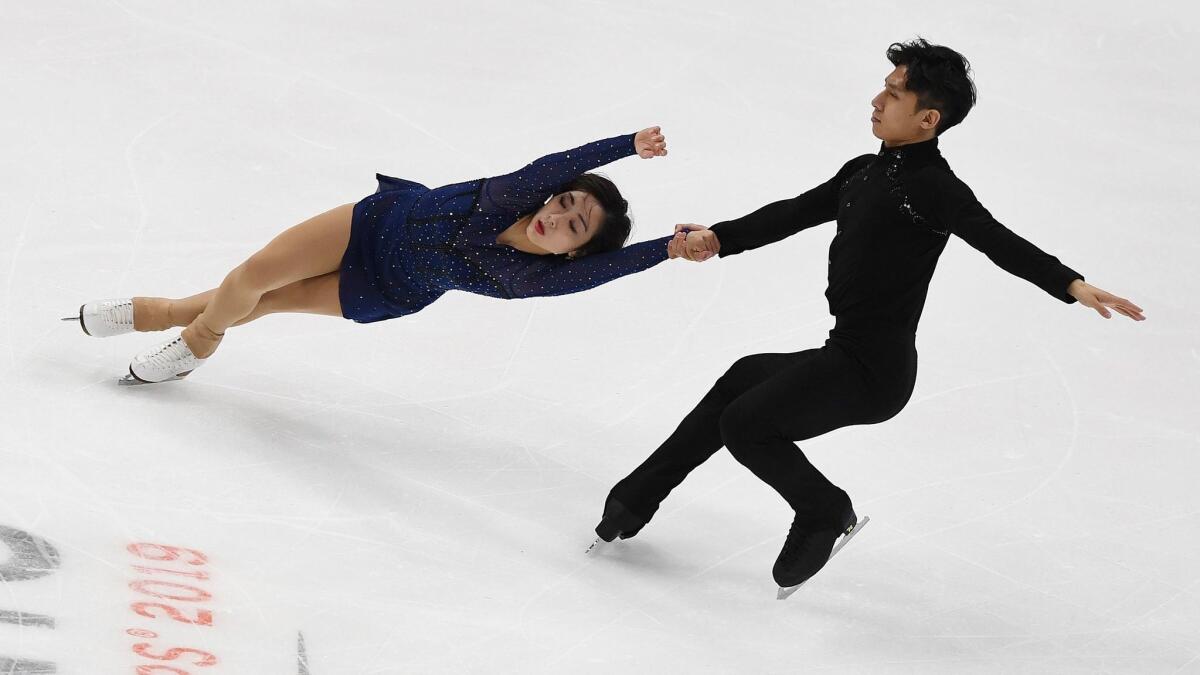Column: Chinese pair Wenjing Sui and Cong Han win title at Four Continents event

- Share via
The lasting memory of Sui Wenjing and Han Cong’s free skate program will be of their beauty and unison and magical connection to their music, not the small mistakes they made in a performance that allowed them to narrowly win the pairs title at the Four Continents championships on Saturday at Honda Center.
The 2017 world champions and 2018 Olympic silver medalists from China easily pulled off dazzling lifts and twists, and they benefited when early leaders Kirsten Moore-Towers and Michael Marinaro of Canada faltered on a lift midway through a routine to music by Pink Floyd. Sui and Han totaled 211.11 points to 211.05 for the Canadians, who lost .77 of a point on that perilously shaky lift. Cheng Peng and Yang Jin of China were third with 205.42 points.
“Wow, we are only 0.06 points higher than them. So close,” said Han, who added he and his partner were “a little stressed on ice” because they hadn’t practiced the routine a lot. “It was a bit tough because we weren’t familiar enough.”
The pairs discipline remained a weakness for Americans. U.S. champions Ashley Cain and Timothy Leduc had trouble with their jumps and finished fourth with 196.82 points, Haven Denney and Brandon Frazier got a season-best 122.47 for their free skate but finished fifth with 184.18 points, and Tarah Kayne and Danny O’Shea had difficulty with their first move, a lift, and things went downhill from there. They landed sixth among eight teams with 180.36 points.
Moore-Towers called the outcome “bittersweet,” but said the sting was lessened by having lost to a worthy opponent. “This Chinese team, the champions, are my favorite pair skaters maybe ever,” she said. “So it’s nice for us to skate with them and learn from them, and to be so close is thrilling as well.”
Cain, who suffered a concussion while exiting a lift at a competition in December, understandably was concerned when she awoke Saturday and felt “like I was in a fog overall.” After her initial fright she sought a doctor’s help. Replenishing her electrolytes, taking a nap, and getting reassurance from Leduc made her feel fine. “It’s going to be an ongoing process for probably the rest of my life, to be honest,” she said. “Anyone I’ve talked to that has suffered a concussion always has moments where they feel the symptoms again and you don’t always know how you’ll feel when you wake up that day, but you have to do everything you possibly can to make yourself feel the healthiest you can.”
Cain and Leduc will be the lone U.S. pair at the world championships next month in Saitama, Japan. “I think this only sets us up better for worlds because it gave us adversity,” she said. “Nothing came easy today and we put out a really good performance.”
Olympic silver medalist Shoma Uno of Japan won the men’s title late Saturday night by performing a riveting and near-flawless free skate routine to Beethoven’s “Moonlight Sonata” and earning a record 197.36 points for his program. Uno, who was fourth after the first segment of the competition, cleanly landed three quadruple jumps and finished with 289.12 points to outdistance a strong field. Vincent Zhou of San Jose, the leader after the first part of the competition, dropped to third overall with 272.22 points after the judges penalized him for under-rotating three of his jumps in his free skate program, a problem that has long plagued him. Jin Boyang of China took second with 273.51 points.
America’s Jason Brown narrowly missed cleanly landing a quadruple jump for the first time in competition and finished fifth after delighting the crowd with his performance to a Simon and Garfunkel medley. The third American entrant, Tomoki Hiwatashi, finished eighth with 236.79 points.
“I’m very proud of the performance,” Brown said. “It’s a personal best this season so I’m just proud of the growth. Every competition I’ve gone to I’ve just gotten stronger and stronger.” Brown said he got the right number of rotations for the quad even though he didn’t land cleanly and he considered his effort “a step forward.”
The women’s competition was still creating a buzz Saturday, after Rika Kihira of Japan moved up from fifth after the short program to win the title late Friday with a mesmerizing routine that included a rare triple axel jump. The standings changed dramatically: Elizabet Tursynbaeva of Kazakhstan rose from sixth to second with a routine that featured an oh-so-close attempt at a quadruple salchow as well as seven triple jumps, and Mai Mihara of Japan climbed from eighth to third. American Bradie Tennell, the leader after the short program, finished fifth after under-rotating four of her jumps; Lakewood-based Mariah Bell dropped from third to sixth. Tennell and Bell will represent the U.S. at the world championships.
More to Read
Go beyond the scoreboard
Get the latest on L.A.'s teams in the daily Sports Report newsletter.
You may occasionally receive promotional content from the Los Angeles Times.






